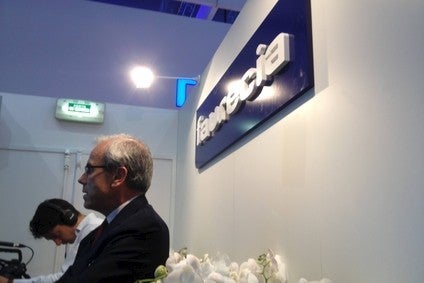
Faurecia says it aims to remove 100kg of weight from cars representing 10g of CO2 as it looks to increase its work with alternative materials such as carbon fibre.
The global suppler already has a composite carbon fibre tailgate, which it says is 35% lighter than the steel version, as well as a a thinwall bumper, some 11% lighter than the current series production version, among other products and is looking to drive down alternative material costs.

Discover B2B Marketing That Performs
Combine business intelligence and editorial excellence to reach engaged professionals across 36 leading media platforms.
Faurecia says there is no theoretical limit to the amount of a body-in-white frame it could produce using carbon fibre, but price remains a hurdle to overcome.
The use of composites and alternative materials such as aluminium, has attracted considerable debate of late, with the French global supplier having also recently announced its 50:50 partnership in the Automotive Performance Materials (APM) consortium to focus on bio-sourced raw materials for lightweighting.
“In general, for me, there is no real limit because you could be able to make a full body-in-white with carbon fibre,” Faurecia director of technology strategy, Christophe Aufrere, told just-auto, on the sidelines of the Paris Motor Show.
“If you buy a Renault Clio, you don’t care about whether it is carbon fibre or steel. But for other cars, of course you can make some carbon fibre parts visible. When you speak about carbon fibre, it is high-tech, so people agree to pay a little bit more.”
Price remains a serious hurdle to overcome however, with a kilogram of carbon fibre currently EUR15 (US$19) and Faurecia is looking to more than halve the cost to EUR7.
“The problem we have in front of us is we have to change a raw material, which today is PAN [polyacrylonitrile],” said Aufrere. “It is half of the total price of carbon fibre.
“We are not a carbon fibre producer and we will not be. So in the new consortium, we have people who can make this raw material.”
The APM consortium also consists of French agricultural cooperative, Interval, to allow development and production of bio-sourced raw materials for lighter vehicles.
Aufrere’s comments concerning the cost of carbon fibre were echoed by Faurecia chairman and CEO, Yann Delabriere, who noted its expense, but stressed the benefits of the material’s mechanical properties and the supplier’s work in lightweighting.
“Weight reduction is the key factor driving reduced fuel consumption,” said Delabriere.
“We believe short to mid-term, we can achieve a weight reduction of up to 100kg representing 10g of CO2. Energy recovery systems can reduce fuel consumption by a further 5g-10g.”
The supplier maintains its combined technologies reduce emissions by 15-20g CO2/km representing 0.8 L/100 km
APM will also soon begin industrial production of BioMat, a 100% bio-sourced plastic that uses fibres and natural resins obtained from biomass, developed in partnership.






